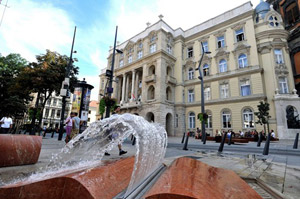
The Eötvös Loránd University case will set a precedent for the accountability of student unions and boost the transparency of their management.
According to a 21 October ruling, Hungary’s largest university – Eötvös Loránd (ELTE) – is being ordered to release the names of student union members in the law faculty who received “public service scholarships” and bonus payments for participating in the student government. This groundbreaking ruling comes in the wake of a freedom of information request filed by the Transparent Education blog in Hungary.
The law on higher education in Hungary establishes student unions at every university in the country, and provides for their funding in order to represent the interests of the students in the managing board of the university. Student union annual budgets are drawn from the core budget of the university. Since most of the universities are state-funded in Hungary, the student unions spend public money.
Most of the student unions pay salaries or “public service scholarships” as compensation for the huge amount of work done by their office-bearers. For example, the student union of ELTE’s law faculty pays around €270 per month to its chair and €140-170 per month to other members. These salaries were made public only after a freedom of information request.
This student union also has a bonus budget of around €2,600 per month (the latest data we have is from 2011) to reward the good work of its officials or other students who helped it. The distribution of these bonuses is kept a secret. It is impossible to know the recipient or the amount of money.
The risk of corruption is high as the student union is free to determine who gets the money – and there are no limitations or exact guidelines on this. However, because the student union spends public money on bonuses and salaries, the way these are spent should be public too.
In April 2012, G. Szabó Dániel, one of the bloggers of Transparent Education (Átlátszó Oktatás) and a student of ELTE’s law faculty, submitted a freedom of information request to the university and to the student union asking the exact amounts of salaries and bonuses, their dates and the name and title of the beneficiaries. The law faculty’s student union did not answer the request, and the university declined it by claiming that the salaries (“public service scholarships”) and bonuses are private data.
Dániel then turned to the Hungarian National Authority for Data Protection and Freedom of Information, which called on the university to make the data public with the restriction that bonuses received by individuals who do not serve as functionaries of the student union are private data and are not to be revealed.
drawing on articles from the
Global Corruption Report: Education.
Hungarian law holds that people who are not student union functionaries do not carry out a public task, and therefore money received by them cannot be made public. These are, for example, people who help at university parties or write an article for the faculty journal and receive money for doing so, but are not functionaries of the student union. (The correspondence with the university and with the Authority can be read here in Hungarian.)
The authority’s decision is not binding. Therefore ELTE had the right to refuse to follow the order, and did so. At the end of 2012, with the legal representation of the Hungarian Civil Liberties Union, Dániel filed an application against ELTE to force it to make the data public. The authority intervened in the court procedure on the side of the blogger to help his case.
Freedom of information prevails
According to the 21 October court ruling handed down by the Budapest Metropolitan Court, ELTE will have to release the names of the law faculty’s student union members who received “public service scholarships” and bonus payments for their participation in the student union. The court agreed with the authority and ordered the university to disclose only the bonuses sent to functionaries of the student union.
The ruling says that all information between 2009 and 2012 will have to be disclosed. Since the freedom of information request was filed in 2012, only data before this date can be dealt with in this decision. The university can appeal against the ruling in which case the data will not yet be made public.
Until this case, there had never been a freedom of information case against a student union in Hungary. Student unions spend a considerable amount of public money every year. For example, those of ELTE’s faculties spent more than €420,000 in 2011. Countrywide, this amount reaches millions of euros.
Student unions often refuse freedom of information requests. This case will set a precedent for the accountability of student unions and boost the transparency of their management.
Átlátszó Oktatás would like to thank the authority and the Hungarian Civil Liberties Union for the pro bono legal representation that they provided.
The original article can be accessed here.
Carousel image: MTI, Hungary, Máthé Zoltán















 Connect with us on Facebook
Connect with us on Facebook Follow us on Twitter
Follow us on Twitter